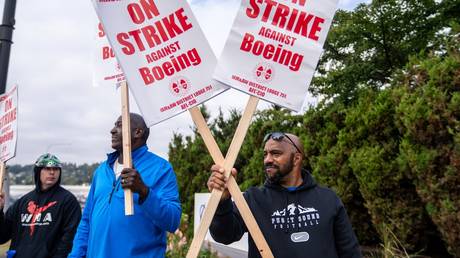
Skilled machinists who contribute to the protection of the US deserve better contract terms, labor union representatives have insisted
Workers at several Boeing Defense plants opted to down tools, risking significant disruption to US fighter jet production.
The strike action, which saw workers walk off the job at plants in St. Louis and St. Charles, Missouri, and Mascoutah, Illinois, followed the collapse of contract negotiations on Sunday.
The US defense giant is facing public scrutiny over safety issues involving its commercial aircraft and repeated delays in delivering key government contracts, including the next-generation Air Force One.
The sites produce several high-profile defense programs, including the F-15 and F/A-18 fighter jets, the T-7A Red Hawk trainer, the MQ-25 Stingray unmanned refueling aircraft, and other advanced weapons systems. The upcoming F-47 stealth fighter jet is also slated for production in the St. Louis area, though Boeing has not specified whether union or non-union facilities will handle the work.
Roughly 3,200 workers represented by the International Association of Machinists and Aerospace Workers (IAM) are taking part.
Union members voted to turn down Boeing’s latest proposal – a revised four-year labor contract offering additional concessions on scheduling – after previously rejecting a July offer that included up to 40% wage increases for many workers.
”IAM District 837 members have spoken loud and clear, they deserve a contract that reflects their skill, dedication, and the critical role they play in our nation’s defense,” union representative Tom Boelling said. IAM Midwest Territory General Vice President Sam Cicinelli added, “They deserve nothing less than a contract that keeps their families secure and recognizes their unmatched expertise.”
Dan Gillian, Boeing Air Dominance vice president and senior executive for the St. Louis site, expressed disappointment over the decision to strike.
”We are prepared for a strike and have fully implemented our contingency plan to ensure our non-striking workforce can continue supporting our customers,” he said in a statement.
Boeing has posted cumulative operational losses of $42.2 billion since mid-2019, largely stemming from two fatal 737 Max crashes and the extended grounding of its flagship commercial jet. However, the company recently reported some improvement, narrowing second-quarter losses to $611 million.




